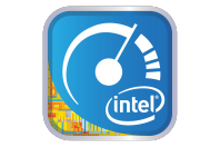Intel brings flash cache acceleration to Linux servers

Solid-state drives (SSD) are fast, but when it comes to today's server and data-center needs, even they're not fast enough. So, what should you do? Perhaps try Intel's just released Cache Acceleration Software (CAS) for Linux, which Intel promises will give your enterprise the performance levels it needs.

Specifically, Intel promises that CAS cab prioritizes "application performance, providing solid-state drive (SSD) levels of speed without migration costs, and built-in data integrity for Intel's SSD data-center family of products."
The idea behind this is to offload I/O from primary local or remote storage to a local, high-performance flash-memory cache, allowing storage to be used for capacity, not over-provisioned for performance. The program is designed to install seamlessly into Windows or Linux and provide a transparent cache solution to users, applications, and storage systems.
CAS works by retrieving first read data from primary storage and then copying it to the CAS flash cache. A second read then pushes data to system memory. Subsequent reads are then returned at high-performance RAM or SSD/Flash speed. All data is written synchronously to both the primary storage and the cache.
The program doesn't just use flash memory. Intel states that it will integrate between the cache on Intel SSD and the server DRAM cache, creating a multi-level cache that optimizes the use of system memory and automatically determines the best cache level for active data.
To make CAS work more efficiently, only the active parts of files are cached, optimizing performance and the utilization of the SSD/Flash cache size. When the cache is full, newly identified active data pushes stale data from the cache, utilizing a proprietary eviction algorithm.
"Intel CAS complements our SSD data center family by providing a total caching solution that delivers even more value and capability for our customers," said Chuck Brown, product line manager for Intel's Non-Volatile Memory Solutions Group in a statement. "Intel CAS delivers a multi-level cache across the SSD and DRAM for optimal performance. Compared to short-stroked hard-drive technology, we've seen up to 50 times the improvement in I/O performance throughput for read intensive workloads by adding Intel CAS with the Intel SSD 910 series1."
Intel also asserted that the "CAS solution provides significantly improved performance for I/O-intensive applications running on dedicated servers or virtual machines (VMs). With its unique policy-based caching, Intel CAS can target performance to specific applications, files, VM or individual database tables. Selective optimized caching allows administrators to focus performance on applications and data that directly impact the business while enabling consistent I/O acceleration by avoiding contention with other applications and server actions."
James Bagley, senior analyst at Storage Strategies-NOW, claimed in an Intel statement that, "With the combination of Intel CAS and the Intel 910 PCIe SSD, Intel has a solution that is a game changer for server-side caching. It allows IT to easily add more performance to their existing storage infrastructure, delivering SSD levels of speed without a complete data migration."
In promoting this new server cache line, Intel is following many other companies, such as SanDisk with FlashSoft and IBM with its purchase of Texas Memory Systems in bringing high-performance flash caching to servers and the data-center. With the rise of big data and endless hunger for quick results from even terabyte-sized databases, there's an ever-growing demand for faster storage.
The Linux version of CAS is scheduled to be generally available within 30 days as an enterprise subscription and open-source release. It will be available for use with the Intel SSD data center family including the Intel DC S3700 and 910 Series.
Related Stories:
- SanDisk FlashSoft expands from Windows, Linux servers to VMware vSphere
- IBM buys Texas Memory Systems, pushes into solid-state storage
- NetApp adds Flash server caching, forges Fusion-io partnership
- Proximal Data - tackling the virtual server I/O problem
- Netflix delivers using commodity hardware and open source software